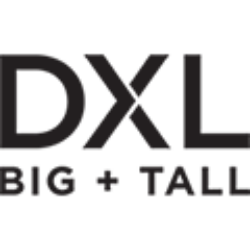
FMP

Destination XL Group, Inc.
DXLG
NASDAQ
Destination XL Group, Inc., together with its subsidiaries, operates as a specialty retailer of big and tall men's clothing and shoes in the United States and Canada. Its stores offer sportswear and dresswear; fashion-neutral items, including jeans, casual slacks, T-shirts, polo shirts, dress shirts, and suit separates; and casual clothing. It also provides tailored-related separates, blazers, dress slacks, dress shirts, and neckwear; and vintage-screen T-shirts and wovens under various private labels. The company offers its products under the trade names of Destination XL, DXL, DXL Men's Apparel, DXL outlets, Casual Male XL, and Casual Male XL outlets. As of January 29, 2022, it operated 220 DXL retail stores, 16 DXL outlet stores, 35 Casual Male XL retail stores, and 19 Casual Male XL outlet stores; an e-commerce site, dxl.com; a mobile site, m.destinationXL.com; and mobile app. The company was formerly known as Casual Male Retail Group, Inc. and changed its name to Destination XL Group, Inc. in February 2013. Destination XL Group, Inc. was incorporated in 1976 and is headquartered in Canton, Massachusetts.
2.81 USD
-0.105 (-3.74%)

EBIT (Operating profit)(Operating income)(Operating earning) = GROSS MARGIN (REVENUE - COGS) - OPERATING EXPENSES (R&D, RENT) EBIT = (1*) (2*) -> operating process (leverage -> interest -> EBT -> tax -> net Income) EBITDA = GROSS MARGIN (REVENUE - COGS) - OPERATING EXPENSES (R&D, RENT) + Depreciation + amortization EBITA = (1*) (2*) (3*) (4*) company's CURRENT operating profitability (i.e., how much profit it makes with its present assets and its operations on the products it produces and sells, as well as providing a proxy for cash flow) -> performance of a company (1*) discounting the effects of interest payments from different forms of financing (by ignoring interest payments), (2*) political jurisdictions (by ignoring tax), collections of assets (by ignoring depreciation of assets), and different takeover histories (by ignoring amortization often stemming from goodwill) (3*) collections of assets (by ignoring depreciation of assets) (4*) different takeover histories (by ignoring amortization often stemming from goodwill)